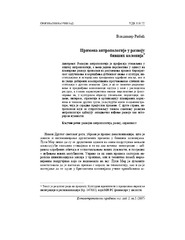Приказ основних података о документу
Primena antropologije u razvoju bivših kolonija
Applying anthropology in the development of former colonies
| dc.creator | Ribić, Vladimir | |
| dc.date.accessioned | 2021-10-12T10:43:50Z | |
| dc.date.available | 2021-10-12T10:43:50Z | |
| dc.date.issued | 2007 | |
| dc.identifier.issn | 0353-1589 | |
| dc.identifier.uri | http://reff.f.bg.ac.rs/handle/123456789/656 | |
| dc.description.abstract | Razvojna antropologija je profesija utemeljena u opštoj antropologiji, a njena jedina perspektiva u odnosu na planiranje razvoja proizlazi iz razumevanja procesa birokratskog odlučivanja i korišćenja dubinskog znanja o kulturi, institucijama i istorijskim trendovima određene zemlje, kao i iz uvida dobijenih komparativnim proučavanjima sličnih institucija u drugim zemljama. Cilj je da se pomogne razjašnjavanje i predviđanje konsekvenci odluka u vezi s raspodelom resursa, a glavna karakteristika ovakve perspektive je fokusiranje na, u kulturnom obrascu utemeljene, percepcije, ciljeve, interese, strategije i organizaciju planiranih korisnika i članova drugih grupa, uključujući elite i administratore, čija je saradnja preduslov promene. S druge strane, antropolozi koji se suprotstavljaju takvom shvatanju razvojne antropologije odbacuju zapadnjačko viđenje razvoja kao istorijske nužnosti. . | sr |
| dc.description.abstract | From the sixth to the eight decade of the twentieth century, horizontally integrated and sector approach intermingled, and the renewed interest for the influence of development on the poor in the second half of the seventies, brought about the larger than ever engagement of anthropologists in developmental projects. In the twenties "sustainable" became the credo for development, and for anthropologists, cultural ecologists and human rights representatives, sustainability meant the capability of the people to preserve and maintained their mode of life. The usual stance is that developmental anthropology as a profession is constituted upon the general anthropology, and that one of its perspectives in relation to the development planning arises from the understanding of the process of birocratic decision making and the use of profound knowledge of cultures, institutions and historical trends in a particular country, as well as from the insights obtained from comparative studies of comparable institutions in other countries. The objective is to arrive to an unambiguous and anticipatory assessment of decisions-consequences relating to the distribution of resources, and the foremost trait of such perspective is the focus on, in a cultural pattern based, perceptions, goals, interests, strategies and organizations of the planned clients and members of other groups, including the elite and the administrators, whose cooperation is a precondition of change. On the other hand, anthropologists who reject such understandings of developmental anthropology, rebuff an occidental view of development as a historical necessity. . | en |
| dc.publisher | Univerzitet u Beogradu - Filozofski fakultet - Odeljenje za etnologiju i antropologiju, Beograd | |
| dc.relation | info:eu-repo/grantAgreement/MESTD/MPN2006-2010/147035/RS// | |
| dc.rights | openAccess | |
| dc.rights.uri | https://creativecommons.org/licenses/by/4.0/ | |
| dc.source | Etnoantropološki problemi | |
| dc.subject | razvojna antropologija | sr |
| dc.subject | razvoj | sr |
| dc.subject | održivost | sr |
| dc.subject | sustainability | en |
| dc.subject | development as a historical necessity | en |
| dc.subject | development anthropology | en |
| dc.title | Primena antropologije u razvoju bivših kolonija | sr |
| dc.title | Applying anthropology in the development of former colonies | en |
| dc.type | article | |
| dc.rights.license | BY | |
| dc.citation.epage | 40 | |
| dc.citation.issue | 1 | |
| dc.citation.other | 2(1): 29-40 | |
| dc.citation.spage | 29 | |
| dc.citation.volume | 2 | |
| dc.identifier.fulltext | http://reff.f.bg.ac.rs/bitstream/id/2186/653.pdf | |
| dc.identifier.rcub | https://hdl.handle.net/21.15107/rcub_reff_656 | |
| dc.type.version | publishedVersion |

